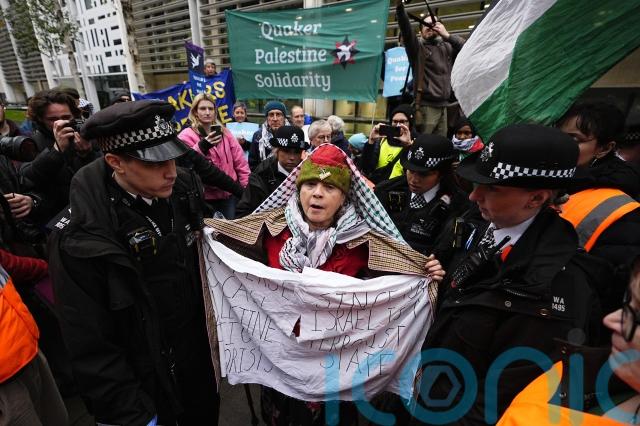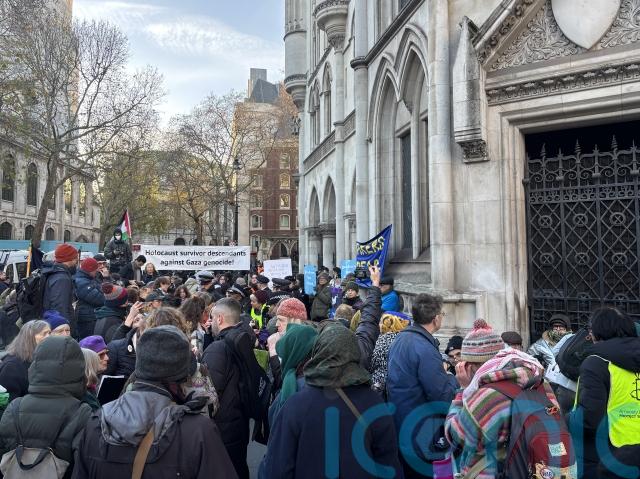
The suffragettes could have faced a ban as a terror group if current laws were in place at the start of the 20th century, the High Court has heard in a challenge against the ban on Palestine Action.
Palestine Action’s co-founder Huda Ammori is taking legal action against the Home Office over then-home secretary Yvette Cooper’s decision to proscribe the group under anti-terror laws.
The ban, which began on July 5, made membership of, or support for, the direct-action group a criminal offence punishable by up to 14 years in prison.
Ms Ammori was previously given the green light to bring her challenge, with her lawyers now arguing at the High Court in London that the decision to ban the group is unlawful.
The Home Office is defending the claim.
At the start of the hearing on Wednesday, Raza Husain KC, for the group’s co-founder, said the ban was unprecedented.
He said: “Palestine Action is the first direct-action civil disobedience organisation that does not advocate for violence ever to be proscribed as terrorist.”

Mr Husain said that Ms Ammori was “inspired by the long tradition of direct-action civil disobedience in this country” and by “people, as she says, taking action to prevent harm before it happens”, citing the suffragettes and Iraq war activists.
He later said: “The suffragettes, of course, had resorted to direct action, property damage and even attempted arson at Westminster Abbey.”
In written submissions, Mr Husain said that “direct action groups of all kinds” could be banned under the conditions used to proscribe Palestine Action.
He continued: “The suffragettes would have been liable to proscription if the Terrorism Act 2000 regime had been in force at the turn of the 20th century.”
The barrister later said that no Home Secretary had considered it necessary to proscribe a protest group as a terrorist organisation “throughout the long history of direct-action protest in the UK”, in order to police or mitigate their actions.
Mr Husain also told the court that there had been more than 2,000 arrests following Palestine Action’s proscription, which included “priests, teachers, pensioners, retired British Army officers” and an “81-year-old former magistrate”.
During the hearing, scores of people assembled outside the Royal Courts of Justice holding placards which read “I oppose genocide, I support Palestine Action”.
Several demonstrators were carried away by police officers.
Owen Greenhall, also for Ms Ammori, told the court that protesters holding up signs was “very much classic civil disobedience territory that has a huge history”.
He continued: “The consequence of the Secretary of State’s position is that Rosa Parks would not have any weight to her right to freedom of expression, simply because she deliberately chose not to move on a bus, and that demonstrates the absurdity of the point.”

Sir James Eadie KC, for the Home Office, said the ban “strikes a fair balance between interference with the rights of the individuals affected and the interests of the community”.
In written submissions, he also said the Home Secretary did not have to consider what proportion of a group’s actions were “concerned in terrorism”.
He continued: “Parliament intended the proscription regime to be available even where only some of the activities of an organisation are ‘concerned in terrorism’.
“Similarly, there is no requirement that activities ‘concerned in terrorism’ happen at a certain frequency or tempo.”
Sir James also emphasised that the ban has not prevented people from protesting against Israel’s actions in Gaza or in support of Palestinians.
He later said: “Whilst it has at all times been open to supporters of Palestine Action to protest against its proscription without breaking the law, certain individuals have instead repeatedly sought to flout Palestine Action’s proscription.”
At the end of the first day of the hearing, Ms Ammori said that the ban was “one of the most extreme attacks on civil liberties in recent British history” which set a “dangerous precedent for all protest movements, from anti-fascist groups to climate campaigners”.
She said: “We will not stop defending the fundamental freedoms of speech, protest, and political expression that belong to all of us.”
The hearing before Dame Victoria Sharp, Mr Justice Swift and Mrs Justice Steyn is due to conclude on December 2, with a decision expected in writing at a later date.
Subscribe or register today to discover more from DonegalLive.ie
Buy the e-paper of the Donegal Democrat, Donegal People's Press, Donegal Post and Inish Times here for instant access to Donegal's premier news titles.
Keep up with the latest news from Donegal with our daily newsletter featuring the most important stories of the day delivered to your inbox every evening at 5pm.